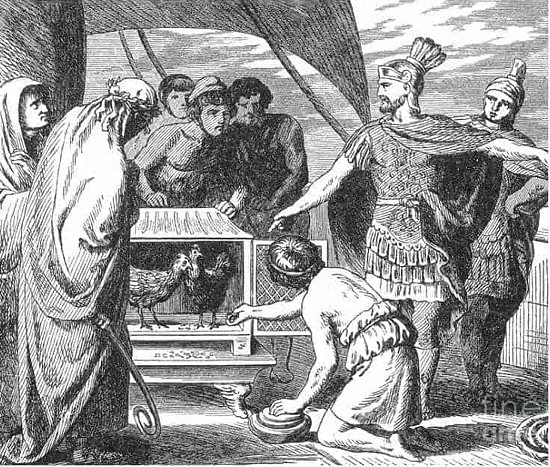The Sacred Chickens of Rome
Strange custom: The ancient Romans were reportedly loath to embark on any major undertaking, particularly battles, before they had consulted sacred chickens. As told by HistoryCollection.com:

However, the advice of the sacred chickens wasn't always followed. As told by the Anecdotes from Antiquity blog:
The pullarius [keeper of the sacred chickens] was responsible for keeping sacred chickens and using them to make divinations or "predictions." These holy birds, which had been sourced from the island of Negreponte (now Euboea, near Athens), were kept unfed in their cages for a predetermined amount of time before being released and presented with some grain. If they ate the grain, the venture upon which the Romans were consulting them was deemed favourable. If they didn't touch it, however, the venture lacked the god's backing and was therefore to be abandoned.

Publius Claudius Pulcher And The Sacred Chickens
However, the advice of the sacred chickens wasn't always followed. As told by the Anecdotes from Antiquity blog:
During the First Punic War, Publius Claudius Pulcher turned to the sacred chickens for approval of his plan to launch a surprise attack on the Carthaginian fleet at the harbour of Drepana. When the chicken watcher notified Pulcher that they were not eating, which constituted a bad omen, he replied, ‘Since they do not want to eat, let them drink!’ and had them hurled into the sea. The naval battle which ensued saw the near annihilation of the Roman fleet.
Comments
Does this have any relation to the idea where if the data doesn't support the hypothesis, then change the data?
Posted by KDP on 05/05/21 at 09:09 PM
In one of Dumas' novels (can't remember which one offhand), the cruelest, most devious, and maniacally paranoid character (a woman, of course) kept chickens in her hidden lair so she could perform divinations, but I think she slit their throats and counted how many times their beaks opened and closed, and then cut them open to study their livers(?). iirc, she also had sheep for really important auguries.
Those passages were quite vivid to me from a young age, a part of the book best left to be read in daylight even when I was grown. Then I watched "The Emperor's New Groove" (2000), and now, my mental image of those scenes is Yzma in her 'secret lab' ("why does she even have that lever?").
Those passages were quite vivid to me from a young age, a part of the book best left to be read in daylight even when I was grown. Then I watched "The Emperor's New Groove" (2000), and now, my mental image of those scenes is Yzma in her 'secret lab' ("why does she even have that lever?").
Posted by Phideaux on 05/06/21 at 12:20 AM
Say what you will about Publius Pulcher, but he wasn't chicken.
Posted by Virtual in Carnate on 05/07/21 at 11:06 AM
@Phideaux: probably livers, yes. Inspecting the liver is a very old kind of divination, too. There were two major kinds of divinators in Rome: an augur would interpret the behaviour of nature - lightning, the flight of birds, and yes, the way chickens fed - and a haruspex would inspect the liver of a sacrificial animal. (Though mixing the two in one attempt is, AFAIAA, unhistoric.)
Posted by Richard Bos on 05/08/21 at 06:48 AM
Commenting is not available in this channel entry.

Category: Animals | Customs | Religion